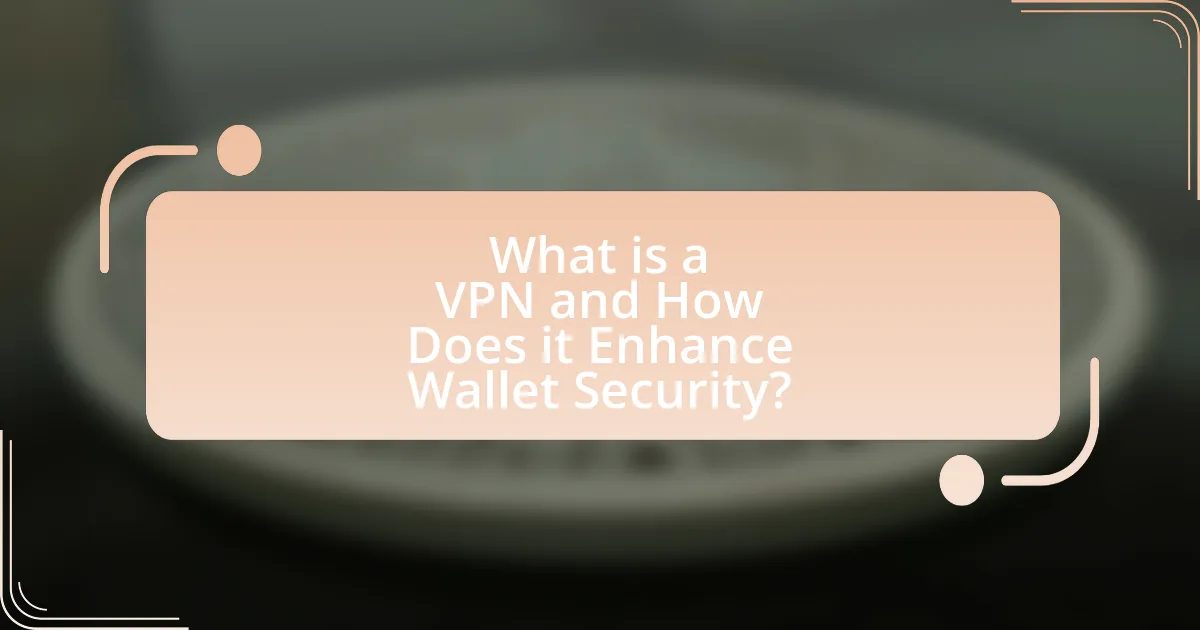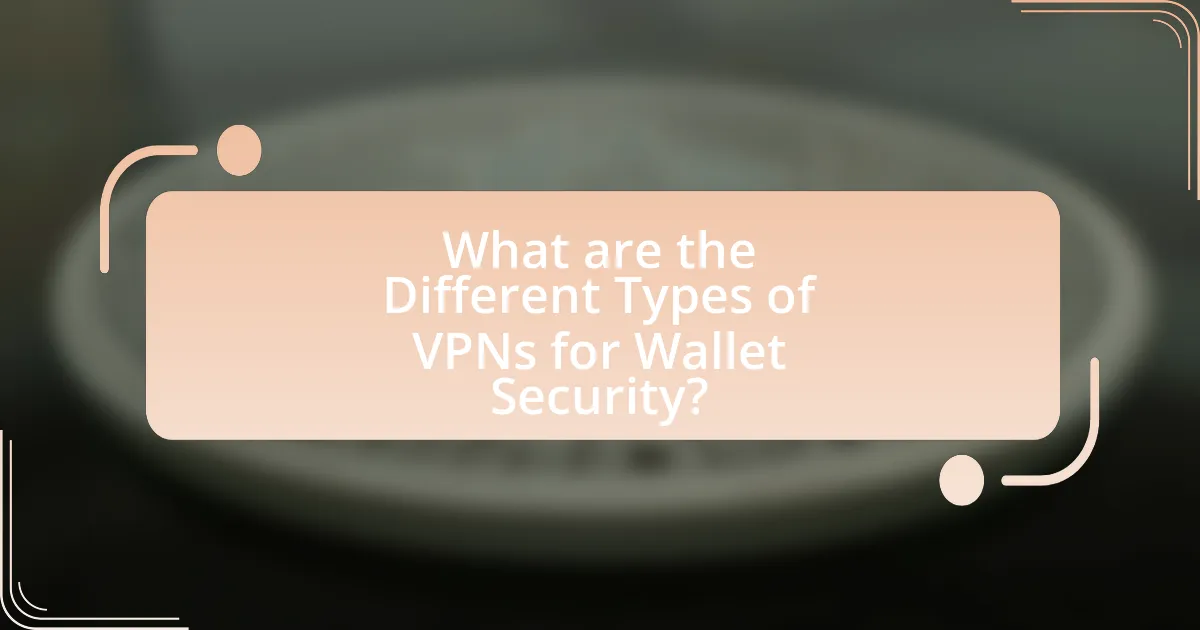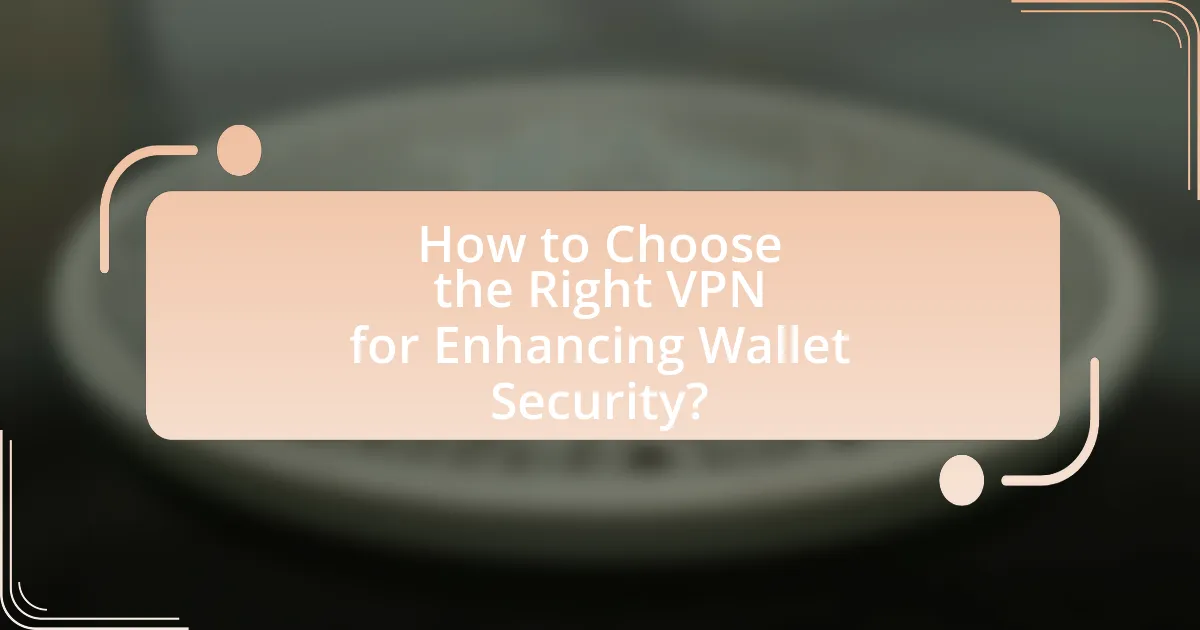A VPN, or Virtual Private Network, is a technology that enhances wallet security by creating a secure and encrypted connection over the Internet, protecting online transactions from cyber threats. This article explores how VPNs work to safeguard sensitive financial information by encrypting data and masking IP addresses, thereby mitigating risks such as identity theft and fraud. It also discusses various encryption methods used by VPNs, the importance of wallet security in the digital age, and the common threats faced by digital wallets. Additionally, the article outlines different types of VPNs, key features to consider when selecting a VPN, and best practices for ensuring optimal wallet security while using a VPN.

What is a VPN and How Does it Enhance Wallet Security?
A VPN, or Virtual Private Network, is a technology that creates a secure and encrypted connection over a less secure network, such as the Internet. By using a VPN, users can protect their online activities, including transactions made through digital wallets, from potential threats like hackers and data snoopers. VPNs enhance wallet security by masking the user’s IP address, making it difficult for cybercriminals to track their online behavior or intercept sensitive information. Additionally, VPNs encrypt data transmitted between the user’s device and the VPN server, ensuring that even if data is intercepted, it remains unreadable. This encryption is crucial for safeguarding financial information and personal data associated with digital wallets, thereby significantly reducing the risk of identity theft and fraud.
How does a VPN work to protect online transactions?
A VPN, or Virtual Private Network, protects online transactions by encrypting the user’s internet connection and masking their IP address. This encryption secures data transmitted between the user’s device and the VPN server, making it difficult for hackers or third parties to intercept sensitive information such as credit card details or personal data. Additionally, by masking the user’s IP address, a VPN helps maintain anonymity, reducing the risk of targeted attacks based on location or browsing habits. Studies show that using a VPN can significantly lower the chances of data breaches during online transactions, as it creates a secure tunnel for data transfer, thereby enhancing overall wallet security.
What encryption methods do VPNs use to secure data?
VPNs primarily use encryption methods such as OpenVPN, IKEv2/IPsec, L2TP/IPsec, and WireGuard to secure data. OpenVPN is widely recognized for its strong security and flexibility, utilizing SSL/TLS for key exchange. IKEv2/IPsec offers robust security and is particularly effective on mobile devices due to its ability to reconnect quickly after a lost connection. L2TP/IPsec combines the Layer 2 Tunneling Protocol with IPsec for encryption, providing a secure tunnel for data. WireGuard is a newer protocol that aims for simplicity and high performance while maintaining strong encryption standards. These methods ensure that data transmitted over the VPN is encrypted, making it difficult for unauthorized parties to intercept or decipher the information.
How does a VPN mask your IP address during transactions?
A VPN masks your IP address during transactions by routing your internet traffic through a secure server, effectively replacing your original IP address with that of the VPN server. This process encrypts your data, making it difficult for third parties to trace your online activities back to your actual IP address. The encryption and rerouting ensure that your real location and identity remain hidden, providing an additional layer of security during financial transactions.
Why is wallet security important in the digital age?
Wallet security is crucial in the digital age due to the increasing prevalence of cyber threats targeting financial information. As more transactions occur online, the risk of data breaches, hacking, and identity theft escalates, making it essential to protect digital wallets from unauthorized access. According to a report by Cybersecurity Ventures, global cybercrime damages are projected to reach $10.5 trillion annually by 2025, highlighting the urgent need for robust security measures. Ensuring wallet security helps safeguard personal and financial data, thereby maintaining trust in digital financial systems.
What are the common threats to digital wallets?
Common threats to digital wallets include phishing attacks, malware, and data breaches. Phishing attacks involve deceptive emails or messages that trick users into revealing sensitive information, such as login credentials. Malware can infect devices and capture personal data or transaction details, compromising wallet security. Data breaches occur when hackers gain unauthorized access to wallet providers’ databases, potentially exposing users’ financial information. According to a report by Cybersecurity Ventures, cybercrime is projected to cost the world $10.5 trillion annually by 2025, highlighting the increasing risks associated with digital financial transactions.
How can a VPN mitigate these threats?
A VPN can mitigate threats to wallet security by encrypting internet traffic and masking the user’s IP address. This encryption protects sensitive data, such as login credentials and transaction details, from interception by malicious actors. Additionally, by masking the IP address, a VPN makes it more difficult for attackers to target users based on their location or online behavior. Research indicates that VPNs can reduce the risk of data breaches and identity theft, as they create a secure tunnel for data transmission, making it significantly harder for cybercriminals to access personal information.

What are the Different Types of VPNs for Wallet Security?
The different types of VPNs for wallet security include Remote Access VPNs, Site-to-Site VPNs, and Mobile VPNs. Remote Access VPNs allow individual users to connect securely to a private network from a remote location, ensuring that wallet transactions are encrypted and protected from potential threats. Site-to-Site VPNs connect entire networks to each other, which is useful for businesses that manage multiple locations and need secure access to shared wallet resources. Mobile VPNs are designed for users on the move, providing secure connections for mobile devices, which is critical for accessing wallets while traveling or using public Wi-Fi. Each type enhances wallet security by encrypting data and masking IP addresses, thereby reducing the risk of cyberattacks and unauthorized access.
How do personal VPNs differ from business VPNs?
Personal VPNs primarily focus on individual users’ privacy and security, while business VPNs are designed to secure corporate networks and facilitate remote access for employees. Personal VPNs encrypt internet traffic to protect user data from surveillance and hacking, often providing features like geo-unblocking and anonymity. In contrast, business VPNs offer advanced security protocols, centralized management, and access controls to protect sensitive company information and ensure compliance with regulations. For example, a study by the International Data Corporation (IDC) highlights that 70% of businesses prioritize VPNs for secure remote work, emphasizing their role in safeguarding corporate data.
What features should you look for in a personal VPN for wallet security?
When selecting a personal VPN for wallet security, prioritize features such as strong encryption, a no-logs policy, and a kill switch. Strong encryption, like AES-256, protects your data from interception, ensuring that sensitive wallet information remains secure. A no-logs policy guarantees that the VPN provider does not store any user activity, which is crucial for maintaining privacy and security. Additionally, a kill switch automatically disconnects your internet if the VPN connection drops, preventing any exposure of your wallet data. These features collectively enhance the security of your wallet by safeguarding against potential threats and unauthorized access.
How can business VPNs enhance security for corporate wallets?
Business VPNs enhance security for corporate wallets by encrypting internet traffic, which protects sensitive financial data from unauthorized access. This encryption ensures that any data transmitted between the corporate network and remote users is secure, making it difficult for cybercriminals to intercept or manipulate transactions. Additionally, business VPNs often include features such as secure tunneling protocols and multi-factor authentication, which further safeguard access to corporate wallets. According to a report by Cybersecurity Ventures, businesses that implement VPNs can reduce the risk of data breaches by up to 80%, highlighting the effectiveness of VPNs in enhancing overall security for financial operations.
What are the pros and cons of using a VPN for wallet security?
Using a VPN for wallet security has both advantages and disadvantages. The primary advantage is that a VPN encrypts internet traffic, which protects sensitive wallet information from potential hackers and eavesdroppers, especially on public Wi-Fi networks. This encryption can significantly reduce the risk of data breaches, as evidenced by a study from the University of Maryland, which found that 70% of cyberattacks target unencrypted data.
Conversely, a notable disadvantage is that not all VPN services are trustworthy; some may log user data or provide inadequate security measures, potentially exposing wallet information instead of protecting it. Additionally, using a VPN can introduce latency, which may affect transaction speeds and user experience. Therefore, while a VPN can enhance wallet security through encryption, users must choose reputable services to avoid compromising their data.
What advantages does a VPN provide for securing transactions?
A VPN provides several advantages for securing transactions, primarily by encrypting data and masking IP addresses. This encryption ensures that sensitive information, such as credit card numbers and personal details, is protected from interception by cybercriminals during transmission. Additionally, by masking the user’s IP address, a VPN enhances privacy and reduces the risk of targeted attacks, as it becomes more difficult for malicious actors to trace online activities back to the user. According to a study by the Cybersecurity & Infrastructure Security Agency, using a VPN can significantly lower the chances of data breaches, making it a crucial tool for secure online transactions.
What potential drawbacks should users be aware of?
Users should be aware that VPNs can introduce potential drawbacks such as reduced internet speed, potential data logging by the VPN provider, and the risk of relying on a false sense of security. Reduced internet speed occurs because VPNs encrypt data and route it through remote servers, which can lead to latency. Additionally, some VPN providers may log user activity, which can compromise privacy if the data is shared with third parties. Lastly, users may mistakenly believe that using a VPN alone guarantees complete security, neglecting other essential security measures like strong passwords and two-factor authentication.

How to Choose the Right VPN for Enhancing Wallet Security?
To choose the right VPN for enhancing wallet security, prioritize a VPN that offers strong encryption, a no-logs policy, and reliable security features. Strong encryption, such as AES-256, protects your data from unauthorized access, while a no-logs policy ensures that your online activities are not stored or monitored. Additionally, features like a kill switch and DNS leak protection further safeguard your wallet transactions by preventing data leaks during unexpected disconnections. Research shows that VPNs with these characteristics significantly reduce the risk of cyber threats, making them essential for secure online financial activities.
What key features should you consider when selecting a VPN?
When selecting a VPN, key features to consider include security protocols, logging policies, server locations, speed, and customer support. Security protocols, such as OpenVPN and IKEv2, ensure data encryption and protection against cyber threats. Logging policies determine how much user data is retained; a no-logs policy is preferable for privacy. The number and location of servers affect access to content and connection speed, with more servers generally providing better performance. Speed is crucial for seamless browsing and streaming, while reliable customer support can assist with technical issues. These features collectively enhance wallet security by safeguarding sensitive financial information during online transactions.
How important is the VPN’s logging policy for wallet security?
The VPN’s logging policy is crucial for wallet security because it determines how user data is handled and whether it can be accessed by third parties. A strict no-logs policy ensures that the VPN provider does not retain any information about user activities, which minimizes the risk of data breaches or unauthorized access to sensitive wallet information. For instance, a study by the Electronic Frontier Foundation highlights that VPNs with transparent logging policies significantly reduce the likelihood of user data being compromised. Therefore, selecting a VPN with a robust logging policy is essential for maintaining the security of cryptocurrency wallets.
What role does server location play in VPN effectiveness?
Server location significantly impacts VPN effectiveness by determining connection speed, latency, and access to geo-restricted content. When users connect to a VPN server that is geographically closer, they typically experience faster speeds and lower latency, enhancing their overall online experience. For instance, a study by the University of California, Berkeley, found that VPN connections to nearby servers resulted in up to 30% faster data transfer rates compared to distant servers. Additionally, server location affects the ability to bypass regional restrictions; connecting to a server in a specific country allows users to access content available only in that region, which is crucial for maintaining wallet security by ensuring access to financial services that may be restricted in their actual location.
How can you set up a VPN for optimal wallet security?
To set up a VPN for optimal wallet security, first choose a reputable VPN provider that offers strong encryption protocols, such as OpenVPN or WireGuard. After selecting a provider, download and install the VPN application on your device. Next, configure the VPN settings to ensure that the kill switch feature is enabled, which will disconnect your internet if the VPN connection drops, preventing exposure of your wallet information. Finally, connect to a secure server location before accessing your wallet to ensure that your IP address is masked and your data is encrypted. This setup minimizes the risk of interception by malicious actors, thereby enhancing the security of your wallet.
What are the steps to install and configure a VPN on your device?
To install and configure a VPN on your device, follow these steps: First, choose a reliable VPN provider and subscribe to their service. Next, download the VPN application from the provider’s website or your device’s app store. After installation, open the application and log in using your account credentials. Then, select a server location from the list provided by the VPN service. Finally, click the connect button to establish a secure connection. This process ensures that your internet traffic is encrypted, enhancing your wallet security by protecting sensitive information from potential threats.
How can you test if your VPN is effectively securing your wallet?
To test if your VPN is effectively securing your wallet, you can perform a DNS leak test and check for IP address leaks. A DNS leak test will reveal if your DNS requests are being routed through the VPN, ensuring that your internet activity remains private. You can use online tools like DNSLeakTest.com to verify this; if the results show your ISP’s DNS servers, your VPN is not securing your wallet effectively. Additionally, check your IP address using a service like WhatIsMyIP.com before and after connecting to the VPN. If your IP address remains the same, the VPN is not functioning properly, which could expose your wallet to potential threats.
What are some best practices for using a VPN with your wallet?
To enhance wallet security while using a VPN, always choose a reputable VPN provider that employs strong encryption protocols, such as OpenVPN or WireGuard. This ensures that your internet traffic, including wallet transactions, is securely encrypted and protected from potential eavesdroppers. Additionally, enable the VPN’s kill switch feature, which automatically disconnects your internet if the VPN connection drops, preventing any unencrypted data from being exposed. Regularly update your VPN software to benefit from the latest security patches and improvements. Furthermore, avoid using free VPN services, as they often compromise user privacy and may log your data, which can be detrimental to wallet security. These practices collectively help safeguard your wallet from unauthorized access and enhance overall security.
How can you ensure your VPN connection is always secure?
To ensure your VPN connection is always secure, use a reputable VPN provider that employs strong encryption protocols, such as OpenVPN or WireGuard. These protocols protect your data by making it unreadable to unauthorized users. Additionally, regularly update your VPN software to patch any vulnerabilities, and enable features like a kill switch, which disconnects your internet if the VPN fails, preventing data leaks. According to a study by the Electronic Frontier Foundation, using strong encryption significantly reduces the risk of data interception, reinforcing the importance of these practices for maintaining a secure VPN connection.
What additional security measures should you take alongside using a VPN?
To enhance wallet security alongside using a VPN, implement strong password management practices. Utilizing complex, unique passwords for each account significantly reduces the risk of unauthorized access. According to a study by the National Institute of Standards and Technology, using a password manager can help generate and store these passwords securely, thereby minimizing the likelihood of password reuse and related breaches. Additionally, enabling two-factor authentication (2FA) adds an extra layer of security, making it more difficult for attackers to gain access even if they obtain your password.